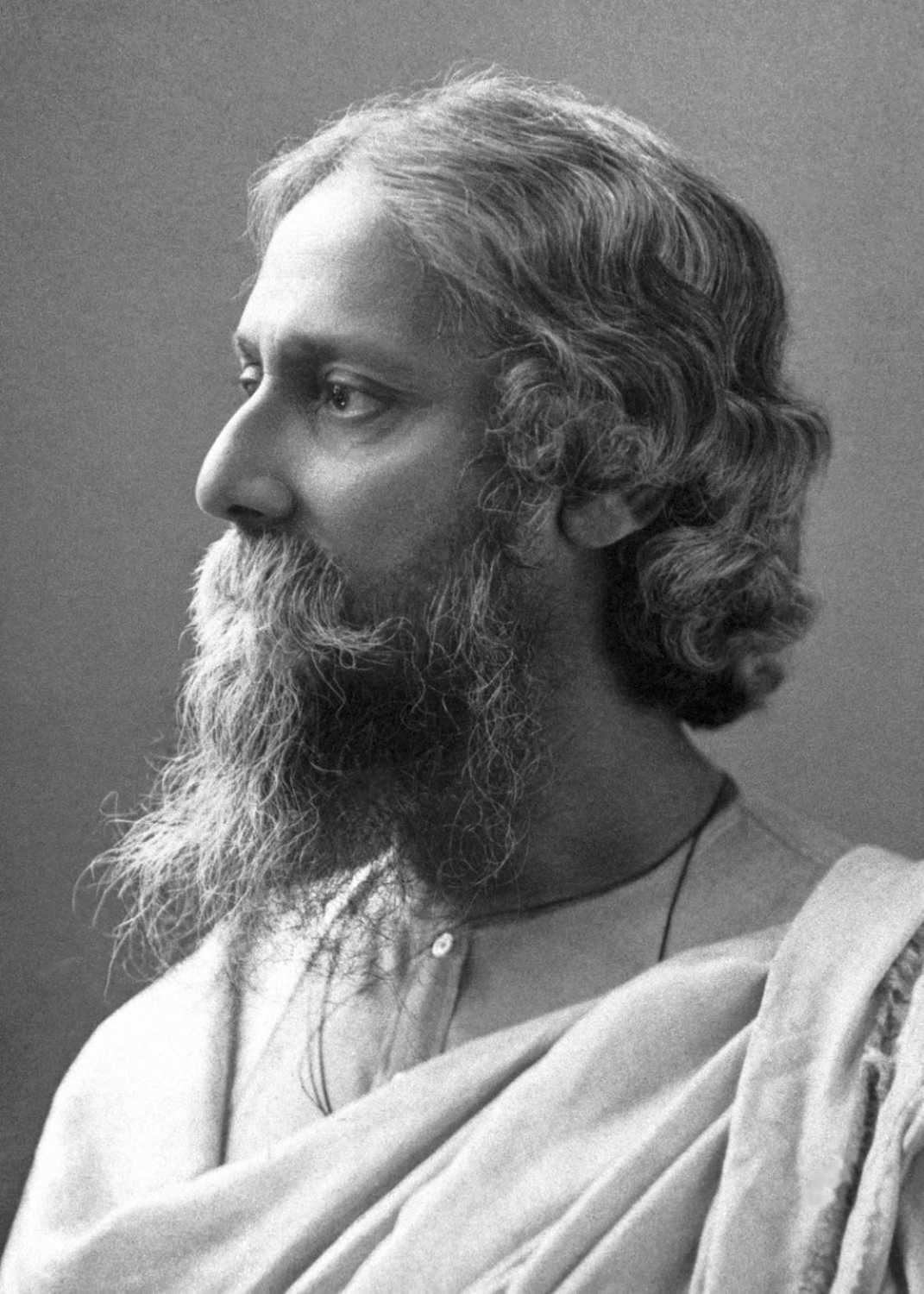Rabíndranáth Thákur nejznámější citáty
Rabíndranáth Thákur: Citáty o pravdě
Rabíndranáth Thákur: Citáty o smrti
Rabíndranáth Thákur citáty a výroky

„Neobětujme slabé silným, chceme-li se sami zachránit.“
Varianta: Neobětujte slabé silným, chcete-li se sami zachránit.

„Radost je jednota naší duše, jednota naší duše se světem.“
Zdroj: [Exley, Helen, Pro klid v duši 365 : Citáty na každý den, Zuzana Pavlová, Slovart, Praha, 2018, 368, 978-80-7529-518-7, 267]
Rabíndranáth Thákur: Citáty anglicky
Sādhanā : The Realisation of Life http://www.spiritualbee.com/spiritual-book-by-tagore/ (1916)
Kontext: In love all the contradictions of existence merge themselves and are lost. Only in love are unity and duality not at variance. Love must be one and two at the same time.
Only love is motion and rest in one. Our heart ever changes its place till it finds love, and then it has its rest. But this rest itself is an intense form of activity where utter quiescence and unceasing energy meet at the same point in love.
In love, loss and gain are harmonised. In its balance-sheet, credit and debit accounts are in the same column, and gifts are added to gains. In this wonderful festival of creation, this great ceremony of self-sacrifice of God, the lover constantly gives himself up to gain himself in love. Indeed, love is what brings together and inseparably connects both the act of abandoning and that of receiving.
“Man goes into the noisy crowd to drown his own clamour of silence.”
110
Stray Birds (1916)
59
The Gardener http://www.spiritualbee.com/love-poems-by-tagore/ (1915)
“Where the mind is without fear and the head is held high
Where knowledge is free”
Gitanjali http://www.spiritualbee.com/gitanjali-poems-of-tagore/ (1912)
Kontext: Where the mind is without fear and the head is held high
Where knowledge is free
Where the world has not been broken up into fragments
By narrow domestic walls
Where words come out from the depth of truth
Where tireless striving stretches its arms towards perfection
Where the clear stream of reason has not lost its way
Into the dreary desert sand of dead habit
Where the mind is led forward by thee
Into ever-widening thought and action
Into that heaven of freedom, my Father, let my country awake.
“We read the world wrong and say that it deceives us.”
75
Zdroj: Stray Birds (1916)
“Never be afraid of the moments—thus sings the voice of the everlasting.”
59
Stray Birds (1916)
“If you shed tears when you miss the sun, you also miss the stars.”
6
Stray Birds (1916)
“Your idol is shattered in the dust to prove that God's dust is greater than your idol.”
51
Stray Birds (1916)
Zdroj: Collected Poems and Plays of Rabindranath Tagore
Quoted often without citation http://www.tagorefoundationinternational.com http://rupkatha.com/V2/n4/11Tagorephilosohy.pdf
Compare this verse verse written by Ellen Sturgis Hooper:
::"I slept, and dreamed that life was Beauty;
I woke, and found that life was Duty."
Disputed
5
The Gardener http://www.spiritualbee.com/love-poems-by-tagore/ (1915)
Kontext: I am restless. I am athirst for faraway things. My soul goes out in a longing to touch the skirt of the dim distance. O Great Beyond, O the keen call of thy flute! I forget, I ever forget, that I have no wings to fly, that I am bound in this spot evermore.
“Open your doors and look abroad.”
85
The Gardener http://www.spiritualbee.com/love-poems-by-tagore/ (1915)
Kontext: Who are you, reader, reading my poems an hundred years hence?
I cannot send you one single flower from this wealth of the spring, one single streak of gold from yonder clouds.
Open your doors and look abroad.
From your blossoming garden gather fragrant memories of the vanished flowers of an hundred years before.
In the joy of your heart may you feel the living joy that sang one spring morning, sending its glad voice across a hundred years.
“Thus great suffering brings with it the power of great endurance.”
Glimpses of Bengal http://www.spiritualbee.com/tagore-book-of-letters/ (1921)
Kontext: When sorrow is deepest... then the surface crust is pierced, and consolation wells up, and all the forces of patience and courage are banded together to do their duty. Thus great suffering brings with it the power of great endurance. So while we are cowards before petty troubles, great sorrows make us brave by rousing our truer manhood.
“Want of love is a degree of callousness; for love is the perfection of consciousness.”
Sādhanā : The Realisation of Life http://www.spiritualbee.com/spiritual-book-by-tagore/ (1916)
Kontext: Want of love is a degree of callousness; for love is the perfection of consciousness. We do not love because we do not comprehend, or rather we do not comprehend because we do not love. For love is the ultimate meaning of everything around us. It is not a mere sentiment; it is truth; it is the joy that is at the root of all creation. It is the white light of pure consciousness that emanates from Brahma. So, to be one with this sarvānubhūh, this all-feeling being who is in the external sky, as well as in our inner soul, we must attain to that summit of consciousness, which is love: Who could have breathed or moved if the sky were not filled with joy, with love?
“We do not stray out of all words into the ever silent”
16
The Gardener http://www.spiritualbee.com/love-poems-by-tagore/ (1915)
Kontext: We do not stray out of all words into the ever silent;
We do not raise our hands to the void for things beyond hope.
85
The Gardener http://www.spiritualbee.com/love-poems-by-tagore/ (1915)
Kontext: Who are you, reader, reading my poems an hundred years hence?
I cannot send you one single flower from this wealth of the spring, one single streak of gold from yonder clouds.
Open your doors and look abroad.
From your blossoming garden gather fragrant memories of the vanished flowers of an hundred years before.
In the joy of your heart may you feel the living joy that sang one spring morning, sending its glad voice across a hundred years.
Gitanjali http://www.spiritualbee.com/gitanjali-poems-of-tagore/ (1912)
Kontext: Where the mind is without fear and the head is held high
Where knowledge is free
Where the world has not been broken up into fragments
By narrow domestic walls
Where words come out from the depth of truth
Where tireless striving stretches its arms towards perfection
Where the clear stream of reason has not lost its way
Into the dreary desert sand of dead habit
Where the mind is led forward by thee
Into ever-widening thought and action
Into that heaven of freedom, my Father, let my country awake.
“Compulsion is not indeed the final appeal to man, but joy is. And joy is everywhere”
Sādhanā : The Realisation of Life http://www.spiritualbee.com/spiritual-book-by-tagore/ (1916)
Kontext: Compulsion is not indeed the final appeal to man, but joy is. And joy is everywhere; it is in the earth's green covering of grass; in the blue serenity of the sky; in the reckless exuberance of spring; in the severe abstinence of grey winter; in the living flesh that animates our bodily frame; in the perfect poise of the human figure, noble and upright; in living; in the exercise of all our powers; in the acquisition of knowledge; in fighting evils; in dying for gains we never can share. Joy is there everywhere; it is superfluous, unnecessary; nay, it very often contradicts the most peremptory behests of necessity. It exists to show that the bonds of law can only be explained by love; they are like body and soul. Joy is the realisation of the truth of oneness, the oneness of our soul with the world and of the world-soul with the supreme lover.
Sādhanā : The Realisation of Life http://www.spiritualbee.com/spiritual-book-by-tagore/ (1916)
Kontext: Man is not entirely an animal. He aspires to a spiritual vision, which is the vision of the whole truth. This gives him the highest delight, because it reveals to him the deepest harmony that exists between him and his surroundings. It is our desires that limit the scope of our self-realisation, hinder our extension of consciousness, and give rise to sin, which is the innermost barrier that keeps us apart from our God, setting up disunion and the arrogance of exclusiveness. For sin is not one mere action, but it is an attitude of life which takes for granted that our goal is finite, that our self is the ultimate truth, and that we are not all essentially one but exist each for his own separate individual existence.
